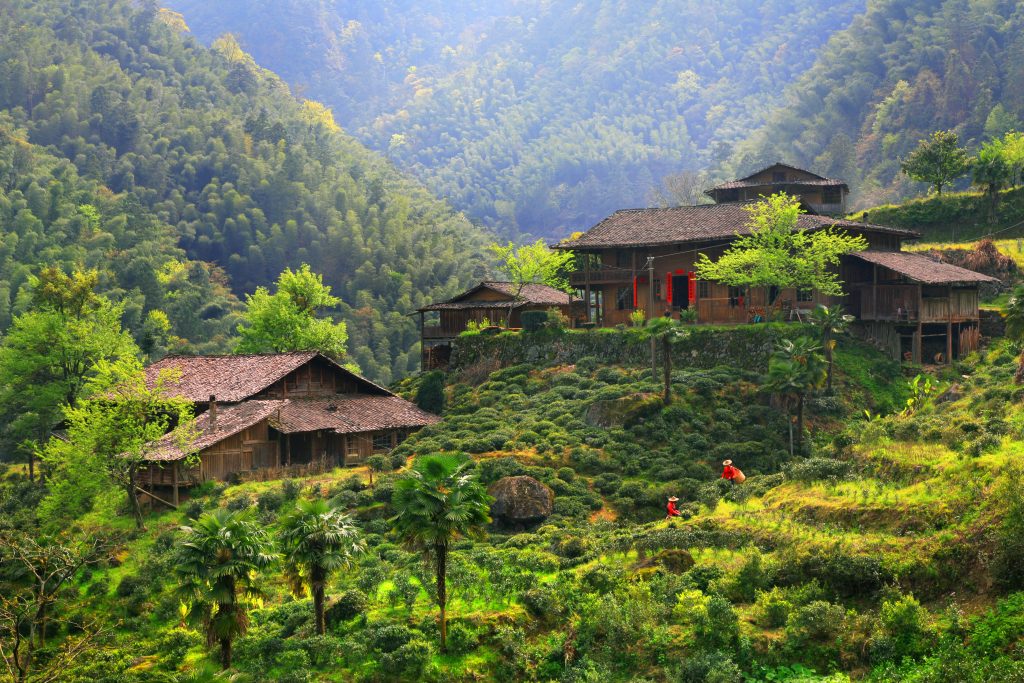$18.00 – $35.00
Featuring a hearty, medium level of smokiness, this traditional lapsang is processed most similarly to the more common export commodity black tea that those in the West may be familiar with, yet promises a genuine Tongmu base material and processing style in a market of imitations.
Expect deep, rosy, potpourri, heavier aromas and bold flavors from a more oxidized leaf to match the more robust smoke treatment. The broth is smooth, hypnotically cooling, concentrated, with less spice and texture than the Light Smoke Lapsang, the slightly less smoky version this family makes for their domestic connoisseur market.
Abiding by tradition, the Li family in Gu Wang Keng of Tongmu Pass use only heirloom plants referred to as 菜茶 cai cha that have been self-seeding there for untold amount of generations as the base material for their smoked teas. This existent, cultivation-escaped variety has adapted well to the acidic, bamboo-covered slopes of Tongmu. While some sources claim the founding of Tongmu was established as early as the late Tang Dynasty in the early 900s, we know that the region, due to limitations in what it can grow, has focused on producing tea from its naturally exceptional base material since at least the late Ming Dynasty (early 1600s).
The Li family are one of just 12 households in Gu Wang Keng and have been producing tea there now for fourteen generations.

The scene from the Li family house in Gu Wang Keng village, one of the smaller, more remote villages of Tongmu. The altitude here is 1000 meters.
Little ol Tongmu: the birthplace of the most global style of tea
桐木关 Tongmu Guan or Tongmu Pass is a hinterland region of the larger Wuyi Mountain area in northern Fujian and is considered to be the birthplace of 红茶 hong cha (literally "red tea"), known as black tea in the West. It happened by accident when a troop of soldiers making their way through the mountains along the provincial border of Jiangxi and Fujian took an less-common route and happened upon Tongmu in the midst of spring tea season. Its villagers taken by surprise, they abandoned their fresh-harvest of laid out withering leaves and ran for the hills. Upon their return, they found their leaves oxidized and damaged due to the soldiers having slept on them! In a last ditch effort to salvage the tea someone thought to burn some of their locally abundant pine tree species, letting the smoke dry out the spoiled looking leaves. The prepared tea of this intervention turned out to be well-received, and not only was red tea AKA black tea invented, the smoky version 正山小种 zheng shan xiao zhong or later known as Lapsang Souchong was also invented. The rest is history.
Smoking traditions adapting to changing times
To further protect this pristine area the government banned the continued harvesting of pinewood in the preserve of Tongmu in 2020. Additionally, they prohibited the import of outside supplemental timber to enter the preserve out of precaution that an invasive pine-boring insect could jeopardize the remaining trees. This effectively decommissioned the iconic old 3 story traditional smokehouses of Tongmu called 青楼 Qing Lou. Out of anticipation, many resident smoked lapsang producers began stockpiling native pinewood prior to the policy shift. Some years later, having burned through much of their finite stockpiles and getting less-than-average aromatic results the more the wood ages, many families including the Li family have constructed new Qing Lous just outside the preserve.
With the advent of the popular and premium-priced Jin Jun Mei about twenty years ago, some families have opted to abandon smoking processes altogether to solely focus on unsmoked teas. While Jin Jun Mei remains the sensation, these days new experimental varietals using Tongmu's excellent base materials seem to always be premiering, each one vying to become the next big blockbuster.
Each story of the Qing Lou is used according to the phase of processing, beginning with initial withering and finally with its finishing roast, ensuring that the leaves 吃烟 chi yan "eat smoke" and the smoke thoroughly integrates into the leaf.
Besides smoking, the leaves are subject to: withering to reduce moisture, rolling to thoroughly bruise the cell walls initiating deeper oxidation, wet-piling to retain moisture and heat to ensure thorough oxidation, wok heat-exposure the fix any remaining oxidative enzymes, and eventually more rolling, smoking, and sorting.
Traditional process Tongmu teas are truly special heirloom substances and you're heartily invited to try this Medium Smoke Lapsang, along with Light Smoke Lapsang, Tongmu Old Bush, and Tongmu Orchid Grotto from the Li family.